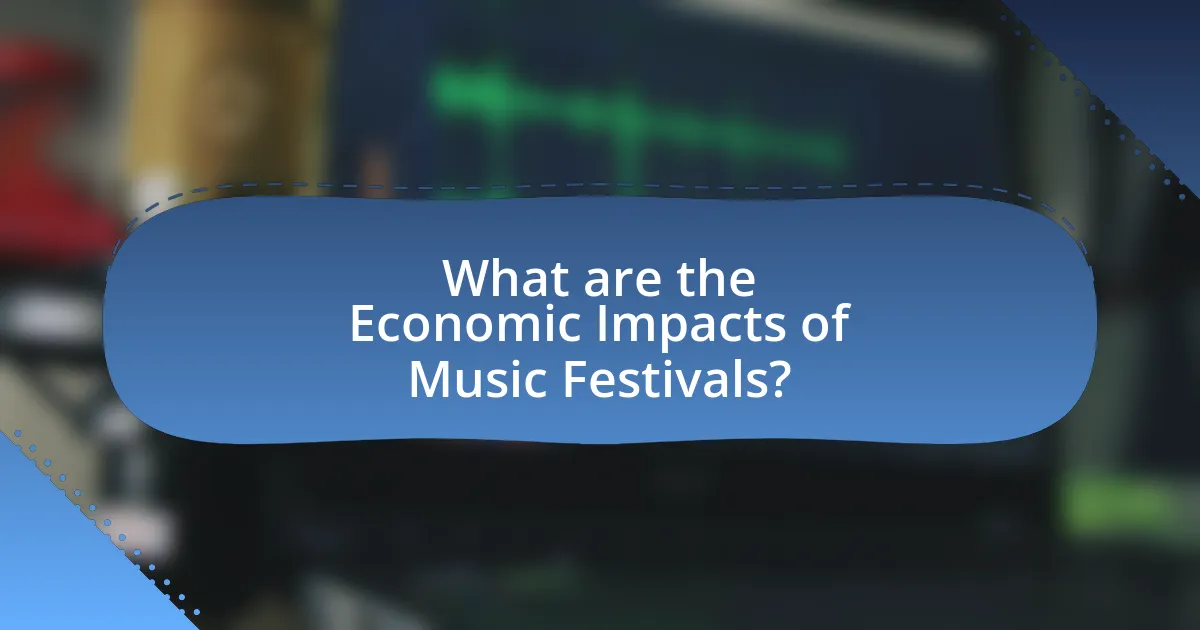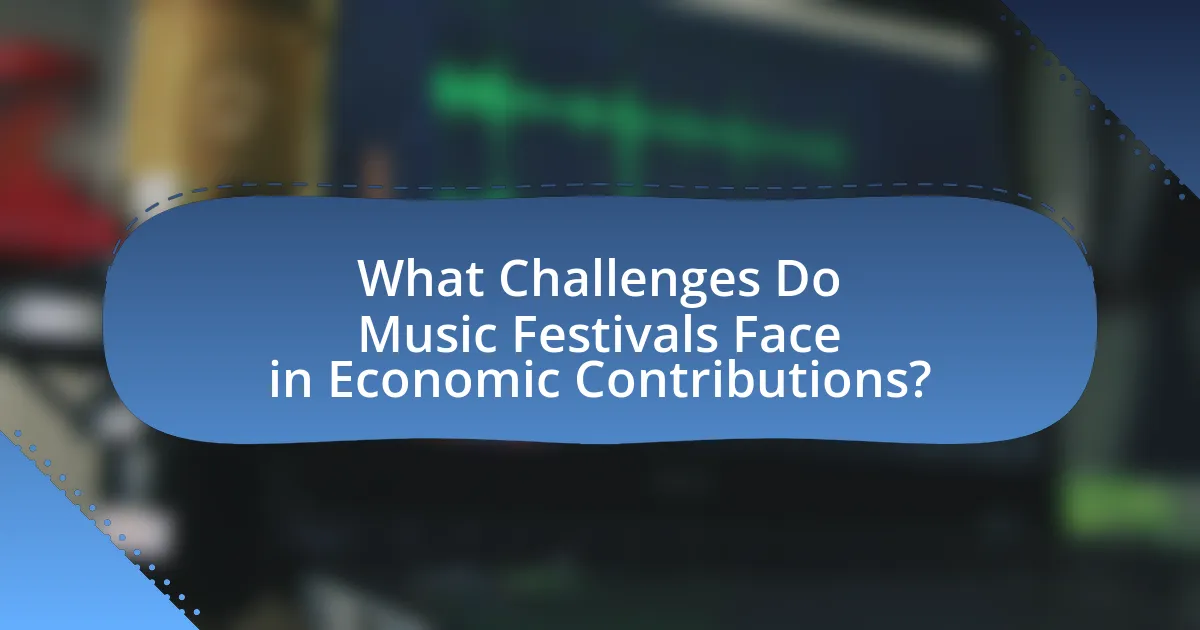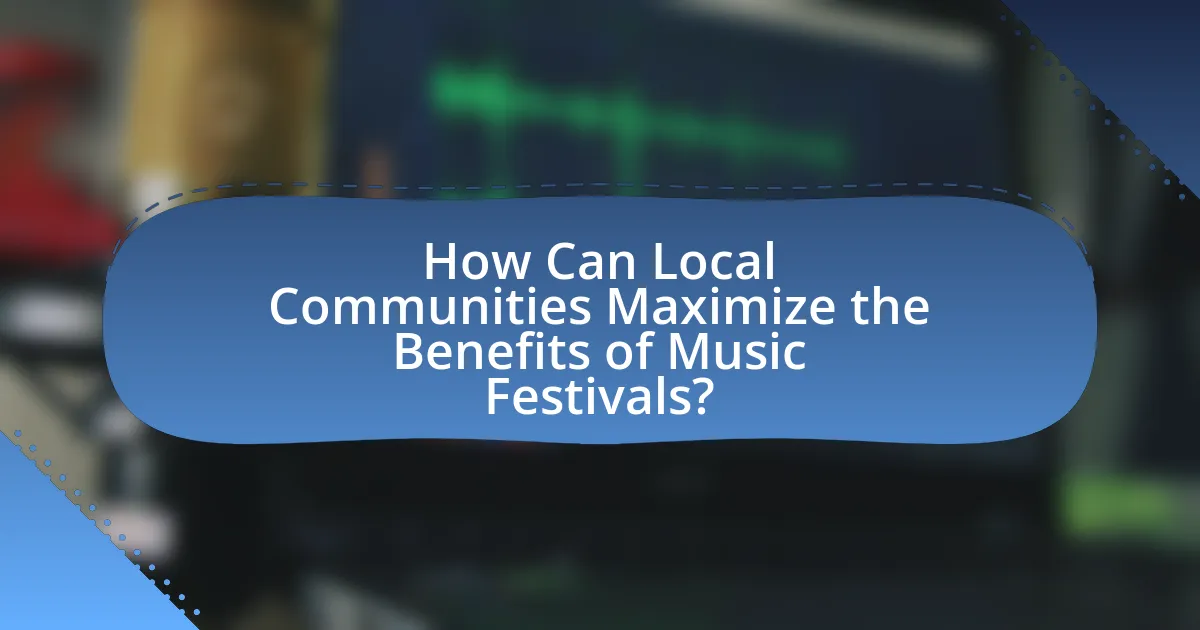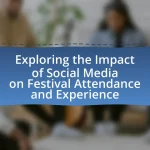The article examines the economic impacts of music festivals on local economies, highlighting their role in generating revenue through tourism, job creation, and increased spending in surrounding businesses. It details how festivals like Coachella significantly contribute to local economies, with millions of dollars in economic impact, and discusses the specific economic activities stimulated by these events, such as hospitality and retail. Additionally, the article addresses challenges faced by music festivals, including high operational costs and external factors affecting attendance, while providing insights into strategies for local communities and organizers to maximize the benefits of hosting such events.

What are the Economic Impacts of Music Festivals?
Music festivals significantly boost local economies by generating revenue through tourism, job creation, and increased spending in surrounding businesses. For instance, a study by the National Endowment for the Arts found that music festivals can attract thousands of attendees, leading to millions of dollars in economic impact for host cities. In 2019, the Coachella Valley Music and Arts Festival contributed approximately $403 million to the local economy, demonstrating how such events can enhance local business revenues, including hotels, restaurants, and retail shops. Additionally, festivals create temporary jobs and stimulate long-term employment opportunities in the area, further solidifying their economic importance.
How do music festivals contribute to local economies?
Music festivals contribute to local economies by generating significant revenue through tourism, job creation, and local business support. For instance, a study by the National Endowment for the Arts found that music festivals can attract thousands of attendees, leading to increased spending on accommodations, food, and transportation. In 2019, the Coachella Valley Music and Arts Festival generated approximately $403 million for the local economy, demonstrating the substantial financial impact such events can have. Additionally, festivals often create temporary jobs in areas such as event management, security, and hospitality, further bolstering local employment rates.
What specific economic activities are stimulated by music festivals?
Music festivals stimulate various economic activities, including tourism, hospitality, retail, and local employment. These events attract visitors who spend money on accommodations, food, transportation, and merchandise, significantly boosting local businesses. For instance, a study by the National Endowment for the Arts found that music festivals can generate millions in revenue for host cities, with attendees often spending an average of $100 per day. Additionally, festivals create temporary jobs in event management, security, and vendor services, further contributing to the local economy.
How do music festivals affect local employment rates?
Music festivals positively impact local employment rates by creating temporary and permanent job opportunities. During festivals, there is an increased demand for staff in various sectors, including hospitality, security, and event management. For instance, a study by the National Endowment for the Arts found that music festivals can generate thousands of jobs in local communities, with events like Coachella reportedly creating over 12,000 temporary jobs in the surrounding area. Additionally, the influx of visitors stimulates local businesses, leading to further employment growth in retail and service industries.
What are the direct financial benefits of hosting a music festival?
Hosting a music festival generates direct financial benefits such as increased revenue for local businesses, job creation, and tourism attraction. Local businesses, including hotels, restaurants, and retail shops, experience a surge in sales due to the influx of attendees; for example, a study by the National Endowment for the Arts found that festivals can increase local spending by up to 30%. Job creation occurs as festivals require staffing for security, vendors, and event management, contributing to local employment rates. Additionally, music festivals attract tourists, which can lead to significant economic impact; the 2019 Coachella Valley Music and Arts Festival reportedly generated over $400 million for the local economy, demonstrating the substantial financial benefits of hosting such events.
How do ticket sales influence local businesses?
Ticket sales significantly influence local businesses by increasing foot traffic and consumer spending in the area. When a music festival sells tickets, it attracts attendees who often spend money on accommodations, food, transportation, and retail, thereby boosting the local economy. For instance, a study by the National Endowment for the Arts found that events like music festivals can generate millions in revenue for local businesses, with some festivals reporting a 30% increase in sales for nearby restaurants and shops during the event period. This influx of visitors not only supports existing businesses but can also encourage new ventures to open, further enhancing the economic landscape of the community.
What role do sponsorships play in the economic success of music festivals?
Sponsorships are crucial for the economic success of music festivals as they provide significant financial support that enhances operational budgets. This funding allows festivals to secure high-profile artists, improve production quality, and expand marketing efforts, which in turn attracts larger audiences. For instance, a study by the Event Marketing Institute found that 84% of festival attendees are more likely to attend an event with notable sponsors, indicating that sponsorships directly influence ticket sales and attendance. Additionally, sponsorships often lead to increased brand visibility for companies, creating a mutually beneficial relationship that drives economic growth for both the festival and the local economy.
Why are music festivals considered a catalyst for tourism?
Music festivals are considered a catalyst for tourism because they attract large crowds of attendees, significantly boosting local economies. These events generate substantial revenue through ticket sales, accommodation bookings, food and beverage purchases, and local transportation services. For instance, the Coachella Valley Music and Arts Festival in California reportedly generates over $400 million annually for the local economy, illustrating the financial impact of such festivals. Additionally, music festivals often promote regional culture and heritage, encouraging visitors to explore the area beyond the event itself, further enhancing tourism growth.
How do music festivals attract visitors from outside the local area?
Music festivals attract visitors from outside the local area primarily through effective marketing strategies, diverse lineups, and unique experiences. Festivals utilize social media, targeted advertising, and partnerships with influencers to reach broader audiences, increasing visibility beyond local communities. Additionally, the inclusion of popular artists and varied genres appeals to a wider demographic, drawing attendees from different regions. Unique experiences, such as themed events or immersive activities, create a compelling reason for visitors to travel. According to a study by the National Endowment for the Arts, events that feature well-known performers can increase attendance by up to 50% from outside the local area, demonstrating the effectiveness of these strategies in attracting non-local visitors.
What is the impact of increased tourism on local infrastructure?
Increased tourism significantly strains local infrastructure by elevating demand for transportation, utilities, and public services. For instance, a surge in visitors can lead to traffic congestion, necessitating upgrades to roads and public transit systems. Additionally, higher tourist numbers often result in increased water and energy consumption, prompting local governments to enhance utility services to meet this demand. A study by the World Travel & Tourism Council indicates that tourism can contribute up to 10% of global GDP, highlighting the economic pressure on infrastructure as communities strive to accommodate growing visitor numbers.

What Challenges Do Music Festivals Face in Economic Contributions?
Music festivals face several challenges in making economic contributions, primarily including high operational costs, fluctuating attendance, and competition from other entertainment options. High operational costs, such as venue rental, artist fees, and logistics, can significantly reduce profit margins, making it difficult for festivals to sustain themselves financially. Fluctuating attendance, often influenced by weather conditions or economic downturns, can lead to unpredictable revenue streams, further complicating financial planning. Additionally, competition from various entertainment forms, including digital streaming and local events, can divert potential attendees, impacting ticket sales and local spending. These factors collectively hinder the ability of music festivals to maximize their economic impact on local economies.
How do weather and external factors affect festival attendance?
Weather and external factors significantly influence festival attendance by affecting attendees’ willingness to participate. For instance, adverse weather conditions such as rain, extreme heat, or cold can deter people from attending outdoor festivals, leading to decreased ticket sales and lower overall turnout. A study by the University of California found that a 10-degree drop in temperature can reduce attendance by 20%. Additionally, external factors like local events, economic conditions, and public safety concerns can also impact attendance. For example, if a competing event occurs simultaneously, it may divert potential attendees, while economic downturns can limit disposable income for entertainment, further reducing festival participation.
What contingency plans can be implemented to mitigate weather-related risks?
Contingency plans to mitigate weather-related risks at music festivals include establishing clear communication protocols, creating flexible scheduling options, and implementing infrastructure improvements. Clear communication protocols ensure that attendees receive timely updates about weather conditions and any changes to the event schedule, which can reduce panic and confusion. Flexible scheduling options allow organizers to adjust performance times or relocate events to indoor venues if severe weather is forecasted, minimizing disruption. Infrastructure improvements, such as installing drainage systems and providing adequate shelter, can help manage adverse weather conditions effectively. Historical data shows that festivals with robust contingency plans experience fewer disruptions and maintain higher attendance rates, demonstrating the effectiveness of these strategies in safeguarding both attendees and local economies.
How do economic downturns influence music festival success?
Economic downturns negatively influence music festival success by reducing consumer spending and attendance. During economic recessions, individuals often prioritize essential expenses over discretionary activities like attending festivals, leading to lower ticket sales and reduced revenue for organizers. For instance, the 2008 financial crisis saw a significant decline in festival attendance, with reports indicating that many events experienced up to a 30% drop in ticket sales. Additionally, sponsors may withdraw financial support during downturns, further straining festival budgets and limiting promotional efforts. This combination of decreased attendance and reduced sponsorship can lead to financial losses and, in some cases, the cancellation of festivals altogether.
What are the financial risks associated with organizing music festivals?
The financial risks associated with organizing music festivals include high upfront costs, potential low ticket sales, and unexpected expenses. Organizers often invest significant amounts in venue rental, artist fees, and marketing, which can lead to financial loss if ticket sales do not meet projections. For instance, a study by the Event Safety Alliance indicates that festivals can incur costs exceeding $1 million, and if attendance falls short, the revenue may not cover these expenses. Additionally, unforeseen circumstances such as bad weather or logistical issues can lead to increased costs or cancellations, further exacerbating financial risks.
How can organizers manage budget overruns effectively?
Organizers can manage budget overruns effectively by implementing strict financial monitoring and contingency planning. By establishing a detailed budget with clear categories and regularly tracking expenses against this budget, organizers can identify potential overruns early. Additionally, setting aside a contingency fund, typically 10-15% of the total budget, allows for unexpected costs without derailing the overall financial plan. Research indicates that festivals with proactive financial management strategies are more likely to remain within budget, as evidenced by a study from the University of California, which found that festivals employing these methods reported 20% fewer budget overruns compared to those that did not.
What insurance options are available to protect against financial loss?
Insurance options available to protect against financial loss include event cancellation insurance, liability insurance, and property insurance. Event cancellation insurance covers losses due to unforeseen circumstances that may cause a festival to be canceled or postponed, such as extreme weather or acts of terrorism. Liability insurance protects against claims arising from injuries or damages that occur during the event, ensuring that organizers are financially safeguarded against lawsuits. Property insurance covers damage to equipment, stages, or other assets used during the festival. These insurance types are essential for music festival organizers to mitigate financial risks and ensure operational continuity.

How Can Local Communities Maximize the Benefits of Music Festivals?
Local communities can maximize the benefits of music festivals by actively engaging in planning and collaboration with festival organizers. This involvement ensures that local businesses, artists, and residents are prioritized, leading to increased economic activity. For instance, a study by the National Endowment for the Arts found that festivals can generate significant revenue for local economies, with some events bringing in millions in tourism dollars. Additionally, communities can implement strategies such as promoting local vendors, offering workshops, and creating volunteer opportunities, which not only enhance the festival experience but also foster community pride and support local culture.
What strategies can local governments implement to support music festivals?
Local governments can implement several strategies to support music festivals, including providing financial grants, facilitating permits, and enhancing infrastructure. Financial grants can help cover operational costs, as evidenced by cities like Austin, Texas, which allocates funds to support its South by Southwest festival, boosting local tourism and economy. Facilitating permits streamlines the process for organizers, reducing bureaucratic delays; for instance, cities that have established one-stop permitting processes have seen increased festival applications. Enhancing infrastructure, such as improving public transportation and accessibility, can further attract attendees, as demonstrated by cities that invest in transportation upgrades during major events, leading to higher attendance and economic impact.
How can zoning laws be adjusted to facilitate festival growth?
Zoning laws can be adjusted to facilitate festival growth by allowing temporary use permits for public spaces and reducing restrictions on noise levels during specific hours. These adjustments enable local governments to designate areas for festivals without extensive bureaucratic hurdles, thus promoting economic activity. For instance, cities like Austin, Texas, have successfully implemented flexible zoning regulations that accommodate large-scale events, resulting in significant increases in tourism and local business revenue. By streamlining the permitting process and creating designated festival zones, municipalities can enhance the viability and frequency of music festivals, ultimately boosting local economies.
What partnerships can be formed between local businesses and festival organizers?
Local businesses can form various partnerships with festival organizers, including sponsorship agreements, vendor collaborations, and promotional partnerships. Sponsorship agreements allow businesses to gain visibility by funding festival activities in exchange for branding opportunities. Vendor collaborations enable local food, beverage, and merchandise vendors to sell their products at the festival, enhancing the festival experience while driving sales for the businesses. Promotional partnerships can involve cross-marketing efforts, where local businesses promote the festival through their channels, and in return, the festival promotes the businesses to attendees, creating a mutually beneficial relationship. These partnerships not only enhance the festival’s offerings but also stimulate the local economy by increasing foot traffic and sales for local enterprises.
What best practices should festival organizers follow to ensure economic success?
Festival organizers should implement strategic planning, effective marketing, and community engagement to ensure economic success. Strategic planning involves setting clear goals, budgeting accurately, and assessing potential risks, which can lead to better resource allocation and financial stability. Effective marketing, including targeted advertising and social media campaigns, can attract a larger audience, increasing ticket sales and vendor participation. Community engagement fosters local support and collaboration, which can enhance the festival’s reputation and encourage local businesses to participate, ultimately boosting the local economy. According to a study by the National Endowment for the Arts, festivals can generate significant economic impact, with some events contributing millions to local economies through tourism and spending.
How can effective marketing strategies enhance festival attendance?
Effective marketing strategies can significantly enhance festival attendance by increasing visibility and engagement with potential attendees. Targeted advertising through social media platforms, email campaigns, and local partnerships can create buzz and attract diverse audiences. For instance, a study by Eventbrite found that 80% of event attendees discover events through social media, highlighting the importance of digital marketing in reaching potential festival-goers. Additionally, utilizing data analytics to understand audience preferences allows organizers to tailor their messaging and offerings, further driving attendance. By effectively communicating the unique experiences and benefits of attending the festival, marketing strategies can convert interest into ticket sales, ultimately boosting attendance and contributing to the local economy.
What role does community engagement play in the success of music festivals?
Community engagement is crucial for the success of music festivals as it fosters local support, enhances attendance, and promotes a positive festival atmosphere. Engaged communities contribute to the planning and execution of festivals, ensuring that the events reflect local culture and preferences, which can lead to higher ticket sales and participation. For instance, a study by the National Endowment for the Arts found that festivals with strong community involvement saw a 30% increase in local attendance compared to those without. This engagement not only boosts the festival’s economic impact but also strengthens community ties and promotes local businesses, creating a mutually beneficial relationship between the festival and the community.
What are some practical tips for organizing a successful music festival?
To organize a successful music festival, it is essential to establish a clear budget and secure funding through sponsorships and ticket sales. A well-defined budget allows for effective allocation of resources, ensuring that all necessary expenses, such as artist fees, venue costs, and marketing, are covered. Research indicates that festivals can generate significant local economic impact; for instance, a study by the National Endowment for the Arts found that music festivals can contribute millions to local economies through tourism and job creation. Additionally, selecting a suitable location with adequate facilities and accessibility enhances attendee experience, while effective marketing strategies, including social media promotion and partnerships with local businesses, can increase visibility and attendance.


